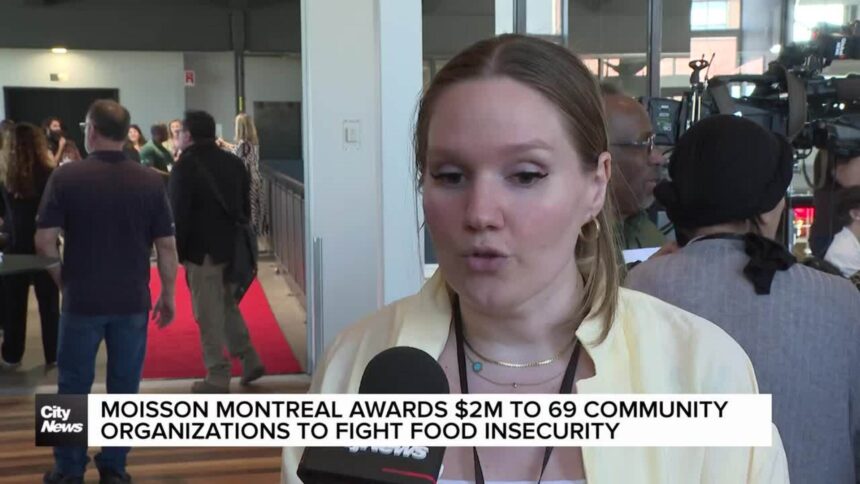Montreal’s battle against food insecurity received a significant boost this week as $2 million in funding was distributed to food agencies across the city. This timely investment comes as many local families continue to struggle with rising grocery costs and economic uncertainty.
The announcement, made yesterday at the Community Food Centre in Côte-des-Neiges, brings welcome relief to organizations witnessing unprecedented demand for their services. Moisson Montréal, the city’s largest food bank, reports a 33% increase in monthly visits since last year – the highest surge in their 40-year history.
“This funding couldn’t come at a more critical moment,” explains Catherine Marcil, Executive Director of Moisson Montréal. “We’re seeing many first-time users – working families, students, seniors on fixed incomes – people who never imagined needing food assistance.”
The $2 million will be distributed among 24 food security organizations throughout Montreal, with allocations based on community needs and organizational capacity. Recipients include neighborhood food banks, community kitchens, and innovative food security initiatives across the island.
According to recent statistics from Food Banks Canada, Quebec has experienced a 25% increase in food bank usage since 2021, with Montreal showing even steeper increases in certain neighborhoods. Notre-Dame-de-Grâce, Parc-Extension, and Montréal-Nord have reported some of the highest jumps in food assistance requests.
One recipient organization, La Corbeille Bordeaux-Cartierville, plans to expand its “cooking on a budget” workshops and food delivery services for mobility-challenged seniors. “Beyond providing emergency food, we need sustainable solutions that address the root causes of food insecurity,” notes François Lamontagne, their program coordinator.
The funding comes from a joint provincial-municipal initiative aimed at strengthening Montreal’s food security network. Mayor Valérie Plante attended yesterday’s announcement, emphasizing the city’s commitment to ensuring all Montrealers have access to nutritious food.
Je suis particulièrement touchée par cette initiative car j’ai récemment visité plusieurs banques alimentaires pour un reportage. Les témoignages que j’ai entendus étaient bouleversants – des familles qui doivent choisir entre payer le loyer ou nourrir leurs enfants. C’est une réalité difficile qui touche plus de Montréalais qu’on ne l’imagine.
The funding allocation has been praised for its community-based approach. Each recipient organization submitted detailed proposals outlining how funds would address specific neighborhood needs. This ensures solutions are culturally appropriate and responsive to local challenges.
Diverse programs receiving support include collective gardens in Hochelaga-Maisonneuve, mobile markets bringing fresh produce to food deserts, and programs specifically supporting newcomers unfamiliar with local food systems.
“Food insecurity isn’t just about hunger – it affects health, education, employment, and community well-being,” explains Dr. Geneviève Mercille from Université de Montréal’s Department of Nutrition. “These investments in food security ultimately benefit our healthcare system and economy.”
However, some community advocates argue that while the funding is welcome, longer-term structural changes are needed. “We appreciate this support, but food banks were never meant to be permanent solutions,” says Jean-Paul Faniel from the Table de concertation sur la faim de Montréal. “We need policies addressing income inequality, affordable housing, and living wages.”
The City of Montreal reports that food insecurity affects approximately 13% of households, with rates significantly higher among single-parent families, recent immigrants, and Indigenous communities.
Several funded organizations are exploring innovative approaches beyond traditional food bank models. The NDG Food Depot is expanding its urban agriculture program, teaching residents to grow food in community spaces while providing fresh produce to their food basket program.
Food security experts point out that many Montrealers facing food insecurity are employed but struggling with low wages and high housing costs. The “working poor” now represent nearly 30% of food bank users in the city, according to Centraide’s most recent analysis.
Organizations receiving funding must provide quarterly reports detailing impact metrics and service delivery. This accountability measure ensures effective use of resources while providing valuable data on evolving community needs.
The $2 million investment, while significant, represents just one component of Montreal’s broader food security strategy. Additional initiatives include reducing food waste through recovery programs, supporting local agriculture, and developing neighborhood food policy councils.
As I finished interviewing participants at yesterday’s announcement, a volunteer approached me. “This funding means we can help more families, but the real story is why so many people need food banks in a wealthy city like Montreal,” she said. Her words highlight the complex challenge before us – addressing immediate hunger while working toward a city where everyone has reliable access to healthy, affordable food.







